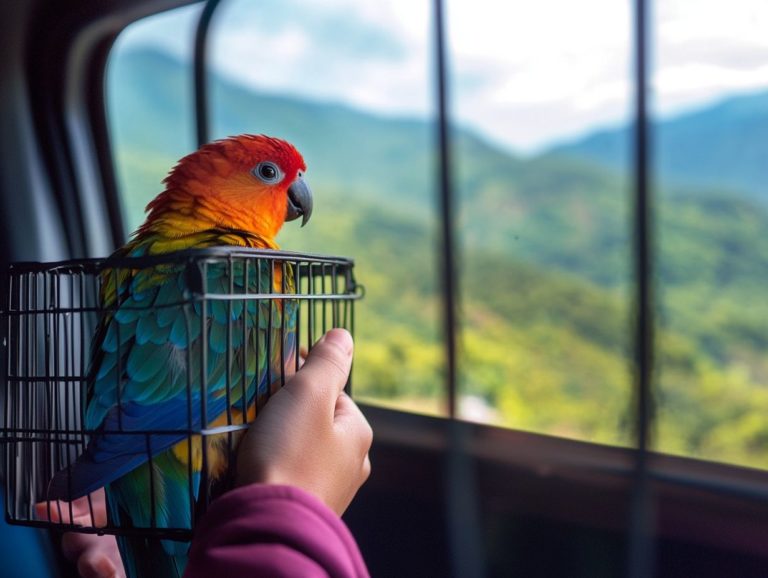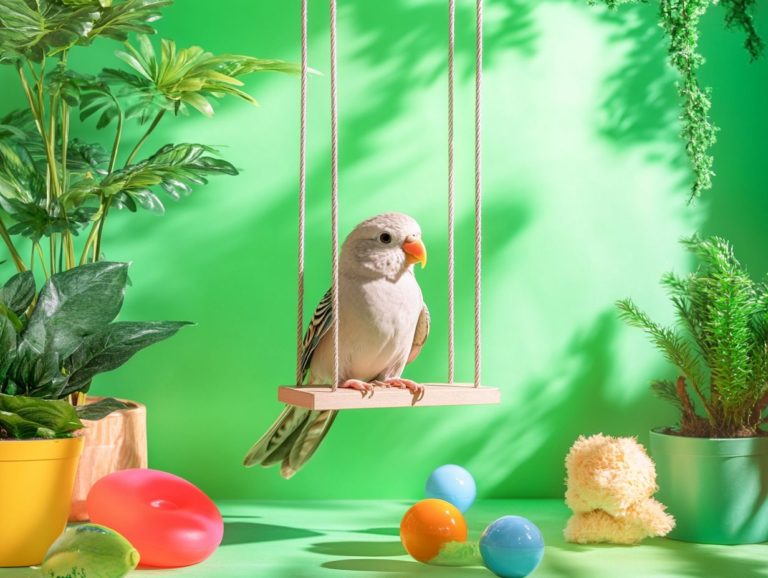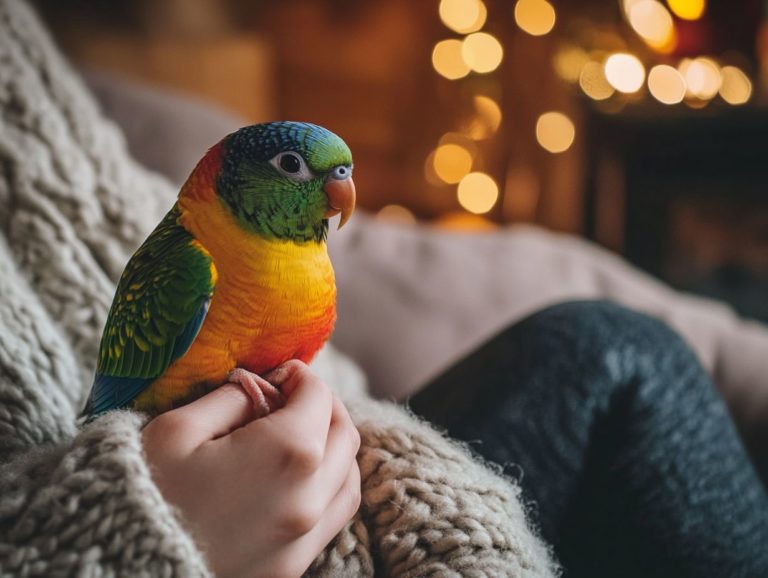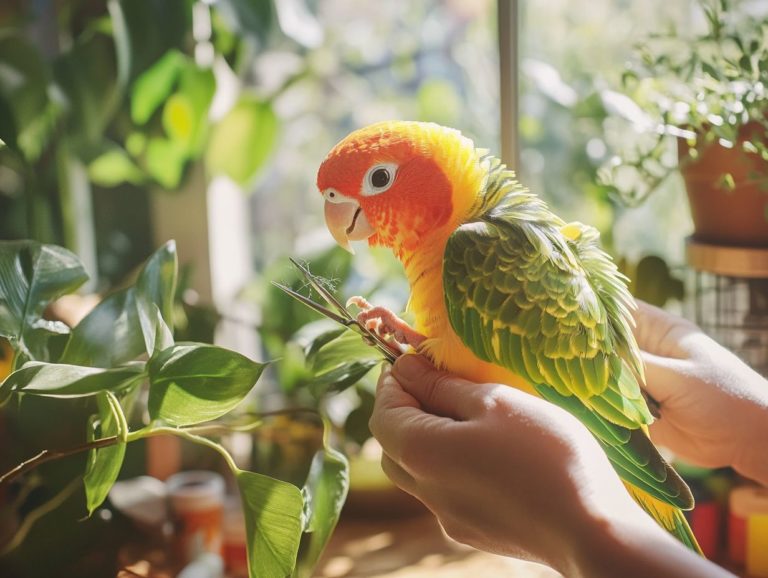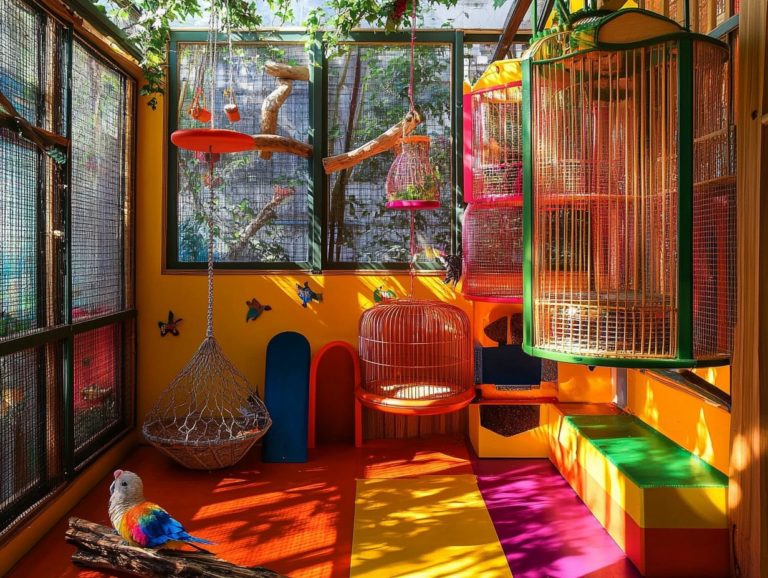What to Do If My Bird is Screaming?
If your feathered companion has suddenly decided to amplify their vocalizations, rest assured, you re in good company. Many pet owners find themselves perplexed by their birds’ screaming and often left scratching their heads about the source of the uproar.
This article delves into the underlying reasons for excessive screeching, guiding you in pinpointing the specific triggers and offering effective training techniques to help manage this behavior.
You will also discover strategies for cultivating a serene environment for your bird, along with insights on when it s time to seek professional assistance.
Contents
Key Takeaways:
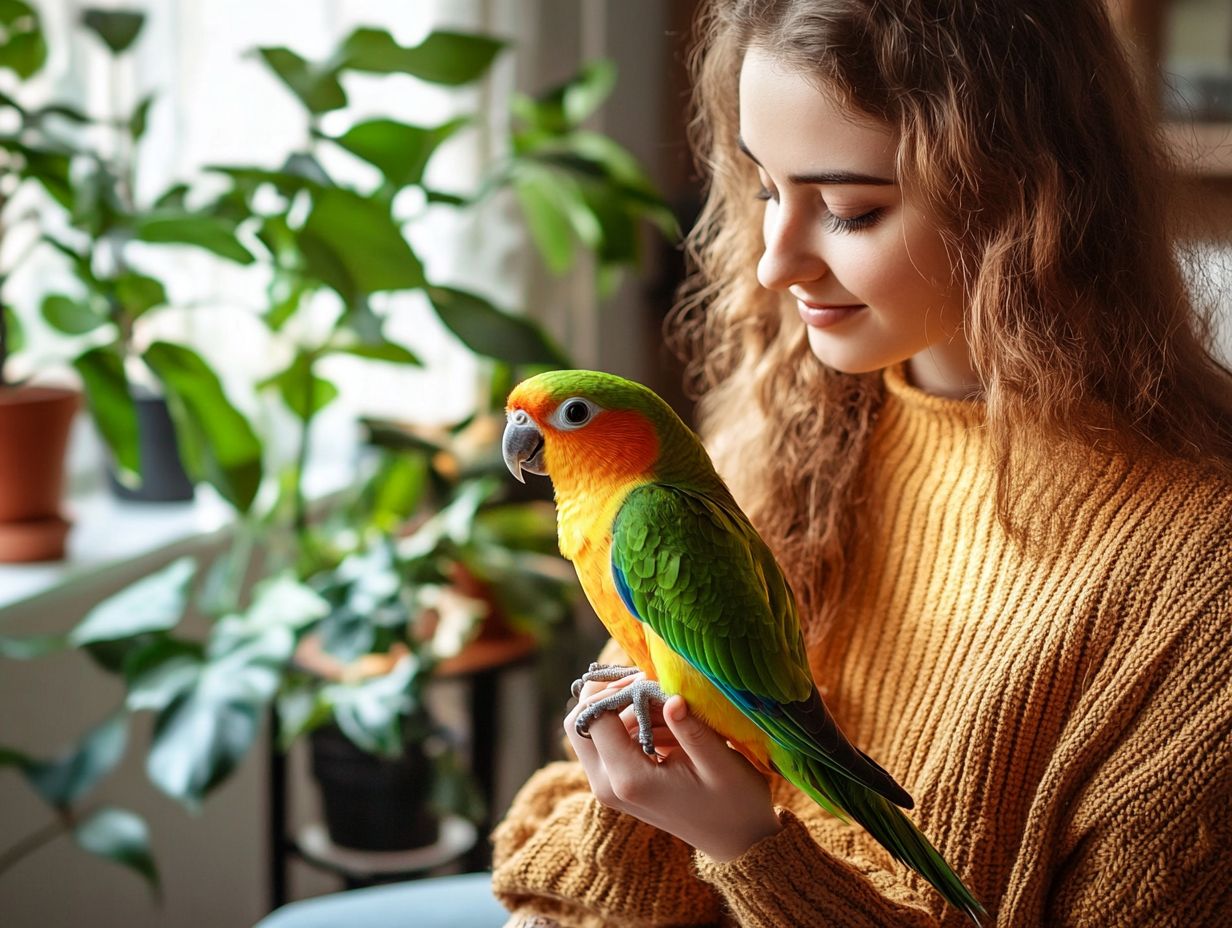
- Excessive screaming in birds may happen for several reasons, such as boredom, fear, and attention-seeking behavior.
- Identifying the root cause of your bird’s screaming and using positive reinforcement and behavior modification techniques can help reduce excessive vocalization.
- Creating a calming and stress-free environment for your bird can make a real difference in managing screaming behaviors.
Understanding Bird Screaming
Understanding bird sounds (vocalizations) is crucial for caregivers and parrot enthusiasts, especially when navigating the distinctive screams of various parrot species like Macaws, Cockatoos, and Sun Conures.
These sounds can denote communication among flock members or may arise from environmental stressors, boredom, or a longing for attention. By identifying the underlying causes of this behavior, you can effectively address it through positive reinforcement and training techniques that foster healthier habits and enhance your bird’s environment.
Causes of Excessive Screaming
Excessive screaming in parrots can arise from a variety of factors, such as a desire for attention, boredom, or stress triggered by environmental changes. These vocalizations often reflect feelings of loneliness, especially when your feathered friend lacks human interaction or the company of other birds.
When there s a lack of mental and physical stimulation, frustration can set in, leading to those louder cries as they strive to express their discontent. Abrupt changes in routine like rearranging their cage or modifying feeding schedules can create a sense of uncertainty and anxiety in these sensitive creatures.
To address these challenges, consider providing engaging toys, ensuring regular social interaction, and maintaining a consistent environment. These measures can significantly enhance your parrot’s well-being and help reduce excessive noise.
Addressing the Root Cause
Addressing the root cause of a parrot’s screaming behavior is essential for effective management. This approach allows you to pinpoint specific triggers and patterns that lead to such vocalizations.
By keenly observing your parrot’s interactions and environmental conditions, you can discern whether the screaming is a call for attention, a response to boredom, or an indication of stress. Understanding these intricate factors enables you to implement tailored strategies that foster better communication and mitigate excessive noise.
Identifying Triggers and Patterns
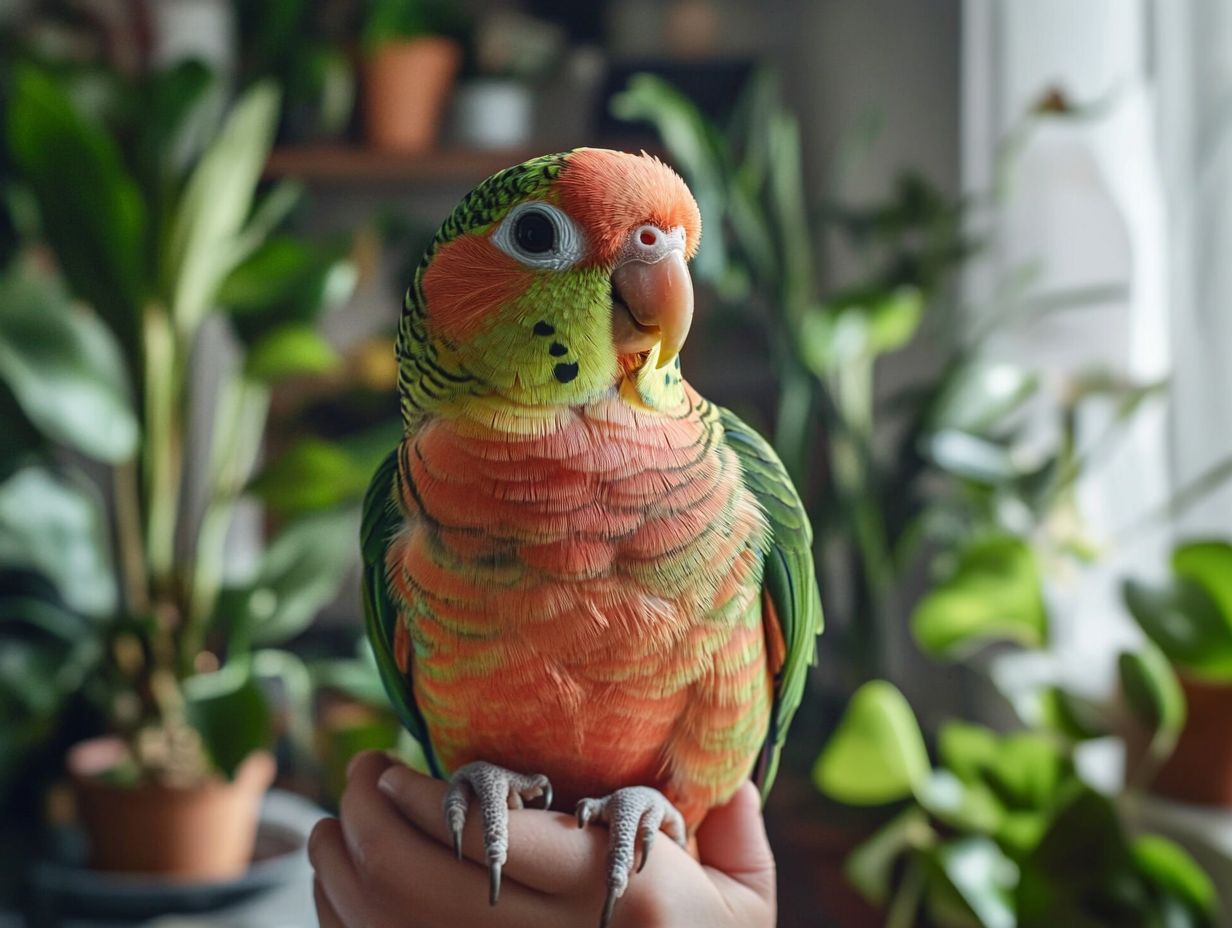
Identifying the triggers and patterns behind your parrot’s screaming can unlock invaluable insights into their behavior and emotional well-being. By carefully monitoring their sounds, you can notice connections between specific events, changes in their environment, and moments of increased noise.
Employing observational techniques, such as maintaining a daily journal or using a simple voice recorder, can be quite beneficial in tracking interactions throughout the day. Pay attention to the timing of those screams, the activities happening around them, and even shifts in lighting or temperature; these details can help reveal consistent patterns.
Creating a chart to categorize different triggers like meal times, social interactions, or unfamiliar sounds can also be incredibly useful. This systematic approach not only assists in pinpointing what prompts your bird’s vocalizations but also deepens your understanding of their needs and preferences.
We encourage you to share your experiences with your birds or ask questions in the comments section below!
Training Techniques to Reduce Screaming
Training techniques centered around positive reinforcement can greatly diminish excessive screaming in parrots. This enables you to cultivate more effective communication and behavioral patterns.
By engaging in consistent interactions and offering rewards such as treats, you can guide your parrot to express its needs and desires in more subdued tones. This will help avoid loud vocalizations.
Embracing these methods enhances your parrot’s overall well-being and deepens the bond you share. It creates a harmonious environment for both you and your feathered companion while reinforcing positive habits.
Positive Reinforcement and Behavior Modification
Positive reinforcement is an incredibly effective strategy for modifying behavior in parrots. It allows you to encourage desired actions while curbing excessive screaming.
This approach relies on rewarding specific behaviors and creates an environment where learning flourishes. By emphasizing calmness during training sessions, you can help your feathered companion connect quiet behavior with positive outcomes.
The rewards can vary widely, from their favorite treats like sunflower seeds to verbal praise or gentle petting. For instance, if your parrot stays quiet during a training exercise, promptly offering a reward reinforces that calmness beautifully.
To implement this strategy effectively, consistency is crucial. Reward the desired behavior every time it occurs. Avoid reinforcing unwanted actions.
This consistency helps your parrot grasp which behaviors lead to those delightful rewards. It sets the stage for a well-behaved and happy companion.
Creating a Calming Environment for Your Bird
Creating a calming space for your parrot reduces stress and excessive screaming. This enhances their overall happiness and well-being.
Thoughtfully modify their habitat to include enriching activities and adequate exercise. Add soothing elements to cultivate a space that meets your parrot’s physical and emotional needs.
A well-designed environment alleviates stress and encourages healthy interactions and communication.
Tips for Creating a Stress-Free Environment
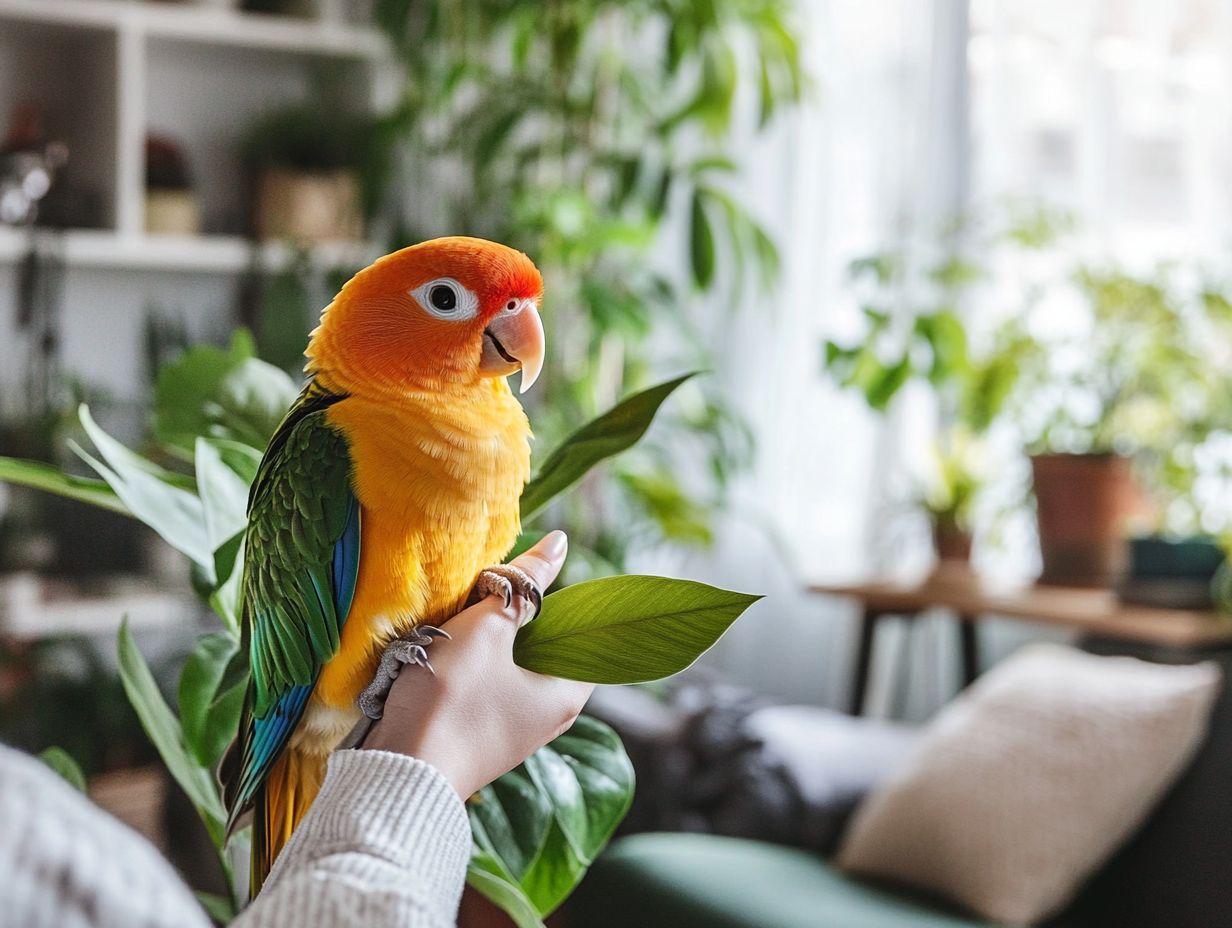
- Incorporate a range of activities that foster both their physical and mental health, especially during the month of August.
- Offer interactive toys that spark their curiosity and encourage problem-solving, like foraging puzzles or delightful bells that reward them for engaging in play.
- Create quiet spaces within their habitat. These serene areas should be distanced from loud noises and bustling activity.
- Weave socialization opportunities into their daily routine through gentle conversation, safe introductions to other pets, or delightful playdates with fellow parrots.
- Address noise pollution by using soft background music to help establish a calming atmosphere. Ensure the space is free from sudden loud sounds to maintain tranquility.
When to Seek Professional Help
Recognizing when to seek professional assistance for your parrot’s screaming behavior is crucial for ensuring their well-being and happiness.
If excessive screaming continues despite your best efforts with training techniques and environmental adjustments, it may be wise to consult an avian behaviorist or veterinarian.
Get help from a pro for personalized strategies that will boost your parrot’s happiness! Engaging a professional can offer tailored strategies that address your parrot’s unique needs, ultimately enhancing their overall quality of life.
Signs that Your Bird Needs Professional Assistance
Recognizing the signs that your parrot may require professional assistance is essential for effectively addressing their screaming behavior.
As highly social creatures, parrots exhibit various behaviors that can indicate distress or underlying issues, especially when something significant changes in their environment. If your parrot suddenly withdraws from social interactions or shows a noticeable decline in appetite, it s a clear signal that something may be amiss.
Altered vocalizations, such as unexpected screaming or unusual silence, can point to emotional distress. Caregivers should pay close attention to these cues. Early intervention is crucial! By being vigilant and responsive to these behavioral signals, seeking professional help when necessary can ensure your parrot’s well-being and create a healthier, happier environment.
Managing Screaming Behaviors in Birds and Addressing Behavioral Issues
Managing screaming behaviors in birds calls for a solid plan that combines training, environmental adjustments, and clear communication between you and your parrot.
Understanding why your bird is vocalizing is essential. Consistency in how you respond to screaming is key; avoid unintentionally reinforcing this behavior with attention or treats. Instead, focus on creating a serene environment filled with enriching activities to help reduce stressors that may lead to excessive noise.
Enhancing communication involves keenly observing your parrot’s body language and vocal patterns. This allows for more personalized interactions.
With patience and dedication, you can establish a solid foundation that fosters quieter and more meaningful exchanges with your avian companion.
Frequently Asked Questions
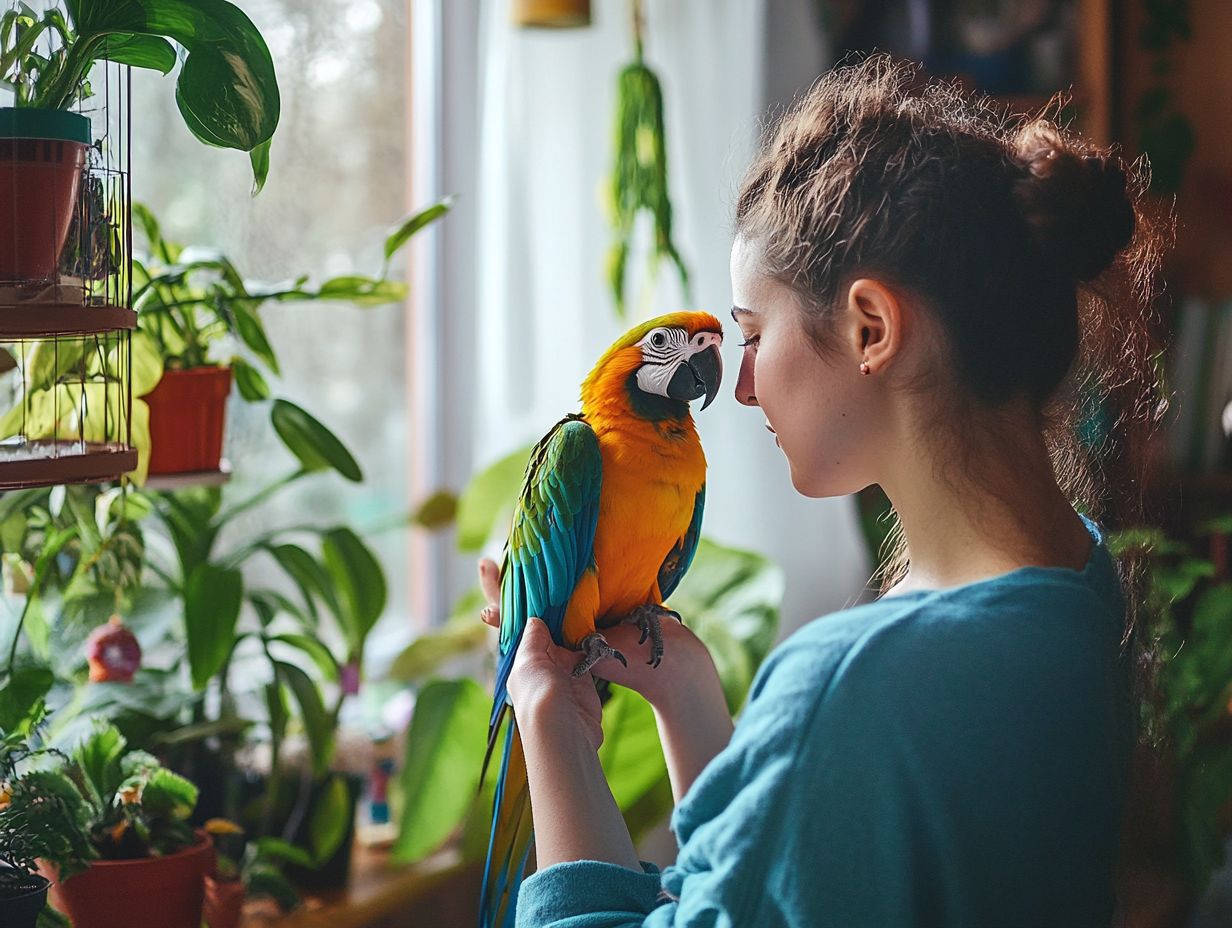
What should I do if my bird is screaming constantly?
If your bird is screaming constantly, it’s important to first figure out the reason behind the behavior. Is your bird scared, bored, or seeking attention? Once you identify the cause, you can work on addressing the issue!
Why is my bird screaming?
There are a variety of reasons why a bird may scream, including fear, boredom, hunger, or hormonal changes. Keep a close eye on your bird’s behavior and environment to determine the cause.
How can I train my bird to stop screaming?
Training your bird to stop screaming takes patience and consistency. Start by positively reinforcing quiet behavior and providing plenty of mental and physical stimulation for your bird. Seek professional help if needed!
Is it normal for birds to scream?
Yes, it’s normal for birds to make noise, including screaming. However, excessive or constant screaming may indicate an underlying issue that needs to be addressed.
What can I do to prevent my bird from screaming when I’m away?
Does your bird scream when you leave? This could be a sign of separation anxiety! To prevent this behavior, gradually increase the amount of time you are away and provide your bird with toys and activities to keep them occupied while you’re gone.
Are there any medical reasons for my bird’s screaming?
Yes, certain medical conditions or pain can cause a bird to scream. If you suspect your bird’s screaming is due to a medical issue, it’s important to take them to a veterinarian for a check-up!

